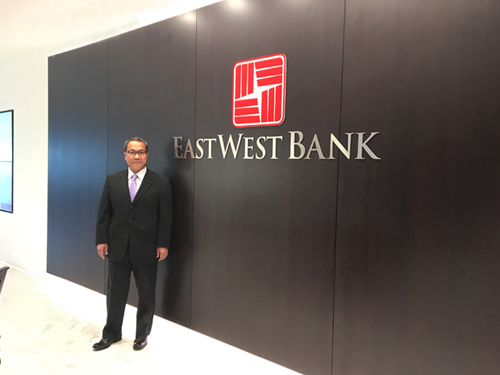Entrepreneur Insight
SBA Lending: the Loans that Could Launch Your Business
By Melody Yuan

Preparation can pay off when you apply for a Small Business Administration (SBA) loan.
A country breakfast serving two pasture-raised and freshly cooked eggs, steamy collard greens, perfectly brown potatoes with decadent biscuits and gravy are laid out before you. The meal, the coffee and the warm staff working at Georgia’s Restaurant in Anaheim, Calif., all came about thanks in part to the business loan that made this dream possible.
This soul food joint is run and owned by Gretchen Shoemaker, who was able to borrow $178,000 under the SBA Community Advantage Loan. “The Community Advantage loan was the spring board to a successful launch of our restaurant,” Shoemaker says.
According to East West Bank’s first vice president and senior relationship manager to SBA, Paul Cheong, “the Small Business Administration (SBA) was created in 1953 with the goal to aid, counsel, assist and protect the interests of small businesses, to free competitive enterprise, and to strengthen the overall economy of the nation.” As someone who has been working in the banking industry for more than 20 years, and specifically in the area of SBA Lending, Cheong says that different businesses need different types of loans.
Why choose SBA loans over others?
For new businesses or business owners without much experience in raising funds, taking out an SBA loan and understanding all of the implications involved are crucial to financial success. So where do you start? “With different loan programs such as the 7a, 504 and Export Program, the SBA reaches out to all small businesses and provides the necessary assistance,” says Cheong. “In most SBA loan programs, the funding comes from a bank and the SBA provides certain guarantees for the funding. For example, in the 504 loan program, a portion of the funding is arranged by a Certified Development Company, on behalf of the SBA.”

" SBA loans are fully amortized, which means that the borrower doesn’t have to worry about renewals or balloon payments."
Mark Hogan, SBA 504 Loan Expert for the Certified Development Company (CDC) in Orange County, Calif., works closely with businesses and banks to consult on SBA topics such as financing structure and eligibility. “The CDC is licensed by the Small Business Administration (SBA) to represent the SBA and service more clients at the grassroots level,” says Hogan. As a nationwide nonprofit that works closely with the SBA, the CDC provides financing and consultation to small businesses through the 504 loan program that offers fixed-rate financing for major fixed assets like property. “How to structure a deal and how long it will take are the most common types of questions that we get, since there are a lot of nuances that many people don’t understand,” says Hogan. Shoemaker was one of the small business owners who received advice from the Certified Development Company before taking out her business loan.
Government-backed loans are traditionally more stable with set interest rate guidelines for both lenders and borrowers. What other benefits are there for businesses that apply for the SBA loan compared to other types of loans?
“In general, the SBA program requires less down payment compared to most conventional loan programs,” says Cheong. “Once a project is deemed eligible, the down payment required for a real estate project, for example, could be as low as 10 to 15 percent. In addition, SBA loans are fully amortized, which means that the borrower doesn’t have to worry about renewals or balloon payments.” Hogan also notes that conventional loans usually require either 20 to 25 percent in down payments. “The SBA also looks at businesses that might not qualify for conventional loans and are more open to supporting businesses with higher risks like startups, expanding businesses and special purposes,” says Hogan. “This propels more small businesses to apply for SBA loans, while bigger corporations with a larger cash flow and stable business model tend to apply for conventional loans.”
What should you know before applying?
According to the SBA website, the loans that are most prominently applied for are the 7a and 504 loan programs. “The 7a is probably the most versatile and widely used general small business loan, while the 504 program is great for owner occupied real estate acquisition projects,” says Cheong. The 7a loan program supports businesses by providing funds to establish a new business, or to assist in an acquisition of an existing business. This loan is versatile because specific terms and numbers can be negotiated between the borrower and an SBA-approved lender. The 504 loan, most commonly referred to as the CDC loan, is mostly applied to larger and longer term projects involving major assets such as real estate. Once the project is approved under the SBA program, Cheong meets with his client to discuss the process and related expectations. “The goal,” says Cheong, “is to try and make the whole process a positive experience for the client, and to build a stronger trust in the relationship.”
What’s important to note is the distinction between the responsibilities of the bank and the responsibilities of the SBA. Businesses seeking to take out an SBA loan must first focus on refining the description and nature of their business to present to the bank. Information and strong arguing points on why your business is projected to flourish based on market competition and working capital etc. are all details that, with strong evidence, will help in getting approval from the bank. Once approved after due diligence, the bank will then write a proposal to present to the credit committee at the SBA, which will provide a guarantee for the program.
Here are a few things to prepare for when applying for the program. Be sure to have at least three years worth of personal tax returns and financial statements at hand. This also applies for your business tax returns. “Having more background on the borrower’s financial history could even help identify the best timing to apply for an SBA loan,” says Cheong. Preparing for a sufficient down payment and working capital are also things that most business owners surprisingly neglect when considering an SBA loan.
SBA loan guidelines can be confusing to navigate alone, and relationship managers like Cheong and consultants like Hogan help guide clients by identifying the related risks and possible mitigation factors in their industry. “In addition to the general commercial lending guidelines, we also evaluate if the applications are eligible under the SBA Program Eligibility checklist,” says Cheong. “The program is targeted to create jobs and business activities, so not all proposals will qualify. Passive investment projects won’t be eligible and our job is to help our client by reducing processing time and provide all of the requested financial documents to the SBA as quickly as possible.” More on the qualifications and eligibility process can be found on the SBA website.
"Normally it takes only five to seven business days for the SBA to approve a loan, based on a credit, appraisal, and environmental standpoint."

How long does it take to become approved?
“Normally it takes only five to seven business days for the SBA to approve a loan, based on credit, appraisal, and environmental standpoints,” says Hogan. “In fact, if you want to make the process faster, you could submit your environmental credentials prior to receiving the credit and appraisal reports.” Additionally, there is no cost for businesses to be preapproved. “If someone gets me a full package with all the necessary documents, I can prequalify them within 24 hours,” says Hogan. “There is no cost to go through the process, and once they do get the loan and are ready to close the deal, the SBA fees get rolled into the loan. If you decide anytime within the contingency period to withdraw your business from the SBA process, it comes at no additional cost.”
According to Cheong and Hogan, once all the documents are assembled, it takes very little time to figure out whether or not a business is eligible for the SBA loan. “The SBA really works for you to try and make the loan,” says Hogan. “Usually you’re either in a solid yes-you-will-get-it area, or in a what-were-you-thinking area. Those that fall in the gray area typically have a unique business or deal, in which case we send in a brief synopsis of what the company is doing and what they’re trying to accomplish to the SBA.”
In addition to the SBA’s flexibility, Cheong adds that, “no matter the state of the economy, there are always clients looking for funding for their next project. At East West Bank, we gauge and deliver the best products and options from the variety that we carry to our clients.”
Both SBA experts agree that the most satisfying part of their job is to help small businesses achieve their dreams and make a living out of helping local communities. The feeling is mutual, as business owners like Gretchen Shoemaker are able to turn ideas into reality with the best advisors and financial options available.
More details on SBA loan programs can be found here. Have questions? Join our upcoming seminar where Paul Cheong will be discussing SBA lending.
Sign up for the Reach Further Newsletter
We’ll keep you in the know about the latest US-Asia business news and trends.
Suscríbase al boletín Reach Further
Lo mantendremos informado sobre las últimas noticias y tendencias comerciales entre Estados Unidos y China.

